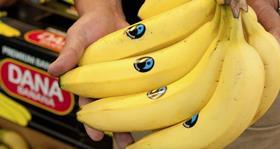
Despite the fact that low prices are often used to drive consumers towards the banana aisle, shoppers would be willing to pay more for Fairtrade-certified bananas.
That is the conclusion of a new study from public opinion research consultancy GlobeScan, which found that 64 per cent of consumers surveyed would purchase Fairtrade bananas at a differential of 10 cents per pound.
“When the price is right, consumers state a strong willingness to pay a premium for Fairtrade bananas over those without a label. It shows that people will support retailers that take the extra step to invest in their supply chains,” said James Morris, US director, GlobeScan.
Generally, the lower the price increase, the more likely consumers were to purchase fair trade bananas. For example, the percentage of consumers likely to purchase increased to 77 per cent with a 5 cent increase, the research showed.
'This is a win-win. Retailers and brands benefit from having a Fairtrade choice in the center of the produce section,” said Derek Mulhern, business development manager at Fairtrade America. “Providing customers with certified produce tells consumers that a business is serious about sharing the story of where their food comes from.'
Fairtrade currently works with over 12,000 small-scale farmers and 10,000 workers in 12 countries. Producer organisations in the Dominican Republic produce the highest volume of bananas, while those in Colombia sell the highest percentage on Fairtrade terms (78 per cent).
Among those producers are the workers on Coliman farms in Mexico. These farms in Colima, Mexico, sell a high proportion of their organic bananas on Fairtrade terms resulting in significant Fairtrade Premium funds that workers invest according to their priorities. Workers have elected to invest in more than 20 projects related to health, education, housing improvements and community support benefiting a total of 595 families and their communities.
“We’re committed to ensuring a safe and supportive workplace on our farms. Obtaining Fairtrade certification has helped us improve livelihoods of our workers and their families,” said Victor Heredia Armendariz, sales manager at Coliman Group. “Our retail partners recognize that and take pride in helping create a more sustainable supply chain for everyone involved.”
Farmers and workers in the banana sector often face low incomes, and difficult and hazardous working conditions. Fairtrade certification has resulted in many positive impacts, including 91 percent of workers in Colombia seeing household assets increase by an average of 64 per cent since their plantation became Fairtrade certified, and three quarters of farmer cooperative members in Ecuador saying their income and wellbeing had improved in the last three years.
Elsewhere, small-scale farmers in Colombia reported an average 34 per cent increase in income due to their affiliation with Fairtrade certified organisations, while 78 per cent of workers interviewed in Ecuador said their health and nutrition had improved over the last year.
“It’s clear that consumers recognise the value of Fairtrade, but retailers are also rewarded when they invest in the farmers and workers at origin,” noted Silvia Campos, global product manager for bananas at Fairtrade International. “With more to invest in responsible production and their communities, banana producers will deliver high-quality products that support livelihoods well into the future.”
The price elasticity research is part of Fairtrade America and GlobeScan’s recent research on attitudes and perceptions around Fairtrade and ethical certifications. The research found that interest in environmental labels continues to surge as consumers demand more from companies.
Clear, transparent labeling was shown to be an important tool to help consumers purchase in line with their values. Fairtrade labels were found to have a halo effect with 81 per cent of consumers saying they would view a brand they already buy more favorably if it carried a fair trade label.
Read the full release on Fairtrade’s recent GlobeScan Research here



